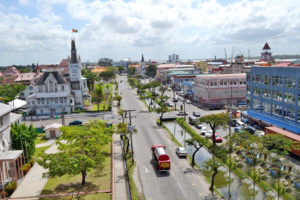…Guyana Govt tells writer of NY Times article on oil sector
The Guyana Government has noted its extreme disappointment with an article written for the New York Times by Clifford Krauss, entitled “The $20 Billion Question.” It has since responded to several of the inaccuracies and the writer’s depiction of Guyana, its people, and their way of life.
In a statement issued by the Finance Ministry on Sunday, it said that it would not address what it described as the “laughably simplistic and selective description” of Guyana. The Ministry said the claim that “the civil service is corrupt” was also an insult to the majority of hardworking and honest public servants.
The Ministry noted that the writer’s assertion that “foreign bank developers have told the Government that legislation to create a sovereign wealth fund … lacks sufficient regulatory controls to avert corruption” and that “the legislation is in limbo,” and has denied stating that this was not the case.
While acknowledging that there were certain dangers surrounding resource-rich countries, the Government said it has extensively researched the issues of the resource curse. It said that is the reason why they are engaged in crafting the National Resource Fund Act (NRFA).

“We have asked for advice from several international institutions, including the International Monetary Fund, the World Bank and the Commonwealth Secretariat,” it explained, noting that the proposed legislation addresses two main issues: stability of the economy and saving for future generations. This, according to the Ministry, is laid out in a Green Paper, which will be presented to the National Assembly.
“The NRFA, which will be laid in Parliament before the end of the year as indicated in Budget 2018, is the culmination of many lessons learnt around the world by resource-rich countries over the past 100 years.”
The Ministry said it would address the transparent handling of, and accounting for, the oil-related funds from them being deposited in the NRF to their spending which can only be done via the Annual Budget approved by the National Assembly.
The Fund itself is to be managed by the Bank of Guyana and overseen by a committee that encompasses several independent interest groups, including a representative nominated by the Leader of the Opposition. Quarterly reports on its activity will be presented to Parliament. “We are confident that the NRFA will fully address these legitimate concerns,” it added.
Returning to the other issues raised in the article, the Ministry said they created an impression that the Government and the country were hapless and unable to deal with the new oil sector. “We acknowledge there are serious human skills deficits, but the Government is proceeding carefully and methodically towards First Oil. The National Resource Fund will be in place before 2020,” it responded.
Despite the article’s narrative of a “Poor man wins the lottery; disaster ensues”, the Ministry said it also drew attention to some of Guyana’s most pressing challenges and raised the question of how Guyanese saw themselves and the country.
“It is time that as Guyanese, we reject the single story being told about us, no matter who tells that story. We must look towards the future with hope in our heritage, in the legacies of our ancestors and in the path that is being crafted for us now. I urge Mr Krauss to take a closer look at our country, its proud and resourceful people and our resilience in the face of the odds,” the statement issued said.
Since the publishing of the article, scores of Guyanese have taken to social media to air their concerns and have heaped criticism on the New York Times and its writer. A majority of Guyanese believe that the writer’s description of Guyana is totally inaccurate and seeks to make Guyana out to seem as one of the worst countries on earth. They believe also foreigners should not be allowed to get away with such untruths.



